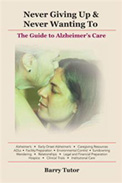
 |
Never Giving Up and Never Wanting To: The Guide to Alzheimer's Care
by Barry Tutor
Trafford Publishing
The author's decision to become caregiver for his wife Lynne, diagnosed with Alzheimers Disease at age 58, offers an insider's observations of the ravages of this illness. Barry Tutor, whose mother also had AD, states unequivocally that, "the role of solo caregiver is definitely not for everyone." Yet he has been caring for Lynne for the past eight years. He describes in detail his daily chores: dressing, undressing, basic hygiene, and near constant vigilance. These tasks increase as the disease progresses. He recalls major steps along the way, such as taking away the car keys. He often repeats that people with AD are "sick, not stupid." He stresses the drawbacks to the role he has taken on: Relatives may withdraw their assistance, despite their solicitous words; the AD sufferer may accuse the caregiver of maltreatment, having quickly forgotten a recent meal or other desired activity; and the caregiver will have to learn to go without sleep.
The book's subtitle may be misleading: This is not an authorized or approved manual. It is a memoir, delineating Tutor's personal approach to a distressing, difficult circumstance; it occasionally veers toward (understandable) negativity, including rants against the healthcare system. Nonetheless, some may appreciate the author's frankness, along with the wide range of tips for a potential AD caregiver or relative. Poignant at times, with wry moments, this is a book to be shared among friends and family of those who suffer from AD, offering a realistic view and some comfort.
RECOMMENDED by the US Review